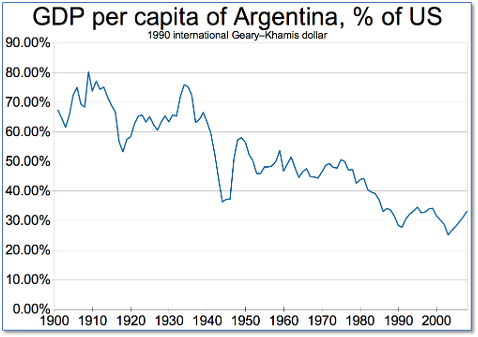Newsroom
Explore our newsroom for our weekly wreck, press releases, and trending topics.
Back from the Dead: How Milei Saved Argentina
Overview
The common view is that once sovereignty begins slipping, it inevitably continues to do so. The combination of high debt, high inflation, high unemployment, and low growth acts as a draw similar to that of a black hole (i.e., there is no escape). Argentina appears to be the rare exception.

Some History
In Argentina was blessed with an abundance of fertile land providing a high level of GDP per capita. During the first three decades of the 20th century, Argentina surpassed Canada and Australia in population, total income, and per capita income. By 1913, Argentina was among the world's ten wealthiest nations per capita and led the world in GDP per capita.¹ ²
What Went Wrong
However, as a result of poor management, devaluations, tariffs, and ineffective high government spending, Argentina's GDP per capita slipped.

What Went Right: Recent Developments
Javier Milei, an economist, is credited with the turnaround of the country, apparently relishing cutting government spending, regulation, and price controls at a rapid enough pace to address the crisis but not so rapidly as to exacerbate the pain:
"As Milei campaigned for President, the inflation rate climbed to more than two hundred percent, and roughly forty percent of the population was living in poverty. Milei earned a following by blaming the trouble on a corrupt caste - la casta - that included politicians, journalists, trade unionists, and academics."
³
Budget Surplus
The latest news is that, according to Reuters, Argentina posted its first budget surplus in 14 years:
"Argentina brought in its first budget surplus in more than a decade in 2024, data published on Friday showed, marking a win for libertarian President Javier Milei and his sweeping austerity push in his first full year in office. The nation's budget surplus came in at 1.76 trillion pesos, or 0.3% of gross domestic product (GDP) in the full year, the economy ministry said. Meanwhile the primary fiscal balance, which excludes debt payments, was up to a 10.41 trillion-peso surplus, or 1.8% of the GDP."
⁴
Trade Surplus
Additionally, Argentina reported a significant trade surplus for 2024:
"Argentina achieved a record $18.9 billion trade surplus in 2024, with December alone contributing $1.67 billion. This marks the thirteenth consecutive month of trade surplus, far surpassing expectations set by a previous Reuters poll, indicating robust economic health."
⁵
Conclusion
Sophisticated institutional investors and risk managers would be well served by noting some dramatic shifts occurring, including in some supposedly unsalvageable areas.
Sources
[1] Yair Mundlak; Domingo Cavallo; Roberto Domenech (1989). Agriculture and economic growth in Argentina, 1913–84. International Food Policy Research Institute. p. 12. ISBN 978–0896290785.
[2] Spruk, Rok (2019). “The rise and fall of Argentina”. Latin American Economic Review. 28 (1): 16. doi:10.1186/s40503–019–0076–2. ISSN 2196–436X.
[3]
https://www.newyorker.com/magazine/2024/12/09/javier-milei-wages-war-on-argentinas-government
[4]
https://www.reuters.com/world/americas/argentina-logs-first-financial-surplus-14-years-2024-2025-01-17/
[5]
https://www.devdiscourse.com/article/technology/3232439-argentinas-record-breaking-trade-surplus-signals-economic-resilience





